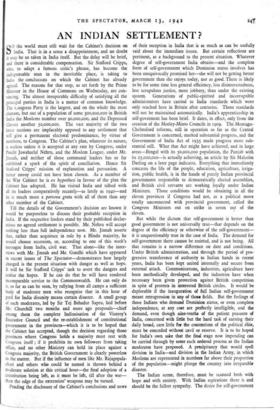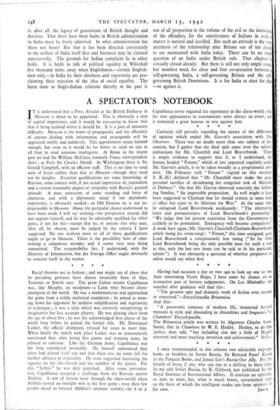AN INDIAN SETTLEMENT ?
S0 the world must still wait for the Cabinet's decision on India. That is in a sense a disappointment, and no doubt it may be so taken in India itself. But the delay will be brief, and there is considerable compensation. Sir Stafford Cripps, who, to adapt a famous critic's phrase, has become the indispensable man in the inevitable place, is taking to India the conclusions on which the Cabinet has already agreed. The reasons for that step, as set forth by the Prime Minister in the House of Commons on Wednesday, are con- vincing. The almost insuperable difficulty of satisfying all the principal parties in India is a matter of common knowledge. The congress Party is the largest, and on the whole the most clamant, but out of a population of some 300,000,000 in British India the Moslems number over 90,000,000, and the Depressed Classes another 5o,000,000. The vast majority of the two latter sections are implacably opposed to any settlement that will give a permanent electoral predominance, by virtue of numbers, to Congress. The Cabinet's plan, whatever its nature, is useless unless it is accepted at any rate by Congress, under Pandit Jawaharlal Nehru, and the Moslem League, under Mr. Jinnah, and neither of those communal leaders has so far exhibited a spark of the spirit of conciliation. Hence Sir Stafford Cripps' mission of explanation and persuasion. A better envoy could not have been chosen. As a member of the War Cabinet he is ex hypothesi in favour of the plan the Cabinet has adopted. He has visited India and talked with all its leaders comparatively recently—as lately as i940—and he is much more a persona grata with all of them than any other member of the Cabinet.
Till the details of the Government's decision are known it would be purposeless to discuss their probable reception in India. If the respective leaders stand by their published declar- ations no agreed settlement is possible. Mr. Nehru will accept nothing less than full independence now. Mr. Jinnah asserts that, rather than acquiesce in rule by a Hindu majority, he would choose secession, or, according to one of this week's messages from India, civil war. That alone—like the inter- views with Mr. Jinnah and Mr. Gandhi which have appeared in recent issues of The Spectator—demonstrates how largely charged is the present situation with danger as well as hope. It will be Sir Stafford Cripps' task to avert the dangers and realise the hopes. If he can do that he will have rendered incomparable service to the Commonwealth. He can only do it, so far as can be seen, by rallying from all camps a sufficient body of moderate men who recognise that in this hour of peril for India disunity means certain disaster. A small group of such moderates, led by Sir Tej Bahadur Sapru, laid before Mr. Churchill two months and more ago proposals—chief among them the complete Indianisation of the Viceroy's Executive Council and the re-establishment of constitutional government in the provinces—which it is to be hoped that the Cabinet has accepted, though the decision regarding those provinces where Congress holds a majority must rest with Congress itself ; if it prohibits its own followers from taking office, and no other Ministry can hold its place against a Congress majority, the British Government is clearly powerless in the matter. But if the influence of men like Mr. Rajagopala- chari and others who could be named is thrown behind a moderate solution at this critical hour—the final adoption of a constitution being left, as it must be left, till after the war— then the edge of the extremists' weapons may be turned.
Pending the disclosure of the Cabinet's conclusions and news of their reception in India that is as much as can be usefully said about the immediate issues. But certain reflections are pertinent, as a background to the present situation. Whatever degree of self-government India obtains—and the complete form of self-government which Dominion status involves has been unequivocally promised her—she will not be getting better government than she enjoys today, nor as good. There is likely to be for some time less general efficiency, less disinterestedness, less scrupulous justice, more jobbery, than under the existing system. Generations of public-spirited and incorruptible administrators have carried to India standards which were only reached here in Britain after centuries. Those standards will not be maintained automatically. India's apprenticeship in self-goverment has been brief. It dates, in effect, only from the creation of the Morley-Minto Councils in 1909. The Montagu- Chelmsford reforms, still in operation so far as the Central Government is concerned, marked substantial progress, and the Government of India Act of 1935 made progress more sub- stantial still. What that Act might have achieved, and in large areas—Bengal with its 50,000,000 population, the Punjab with its 25,000,000—is actually achieving, an article by Sir Malcolm Darling on a later page indicates. Everything that immediately concerns the life of the people, education, agriculture, irriga- tion, public health, is in the hands of purely Indian provincial governments responsible to democratically elected assemblies, and British civil servants are working loyally under Indian Ministers. Those conditions would be obtaining in all the eleven provinces if Congress had not, as a political move totally unconnected with provincial government, called the Congress Ministers out on strike in seven out of the eleven.
But while the dictum that self-government is better than good government is not universally true—that depends on the degree of the efficiency or otherwise of the self-government— it is unquestionably true in the case of India. The demand for self-government there cannot be resisted, and is not being. All that remains is a narrow difference on date and conditions. Under British- administration, and through the period of pro- gressive transference of authority to Indian hands in recent years, India has been kept united internally and secure from external attack. Communications, industries, agriculture have been methodically developed, and the industries have when necessary been given protection against British competition in spite of protests in interested British circles. It would be deplorable if the inauguration of full Indian self-government meant retrogression in any of those fields. But the feelings of those Indians who demand Dominion status, or even complete independence, at any cost are perfectly intelligible, and the demand, even though nine-tenths of the patient peasants of India, concerned with little but the hard task of earning their daily bread, care little for the contentions of the political elite, must be conceded without cavil or reserve. It is to be hoped for India's own sake that the final stage now impending can be carried through by some such ordered process as the Indian moderates have proposed. A precipitancy that would spell division in India—and division in the Indian Army, in which Moslems are represented in numbers far above their proportion of the population—might plunge the country into irreparable disaster.
The Indian scene, therefore, must be scanned both with hope and with anxiety. With Indian aspirations there is and should be the fullest sympathy. The desire for self-government is, after all, the legacy of generations of British thought and doctrine. That there have been faults in British administration in India must be freely admitted. In what administration has there not been? But that it has been directed consistently to the welfare of India itself first and foremost may be claimed unreservedly. The grounds for Indian complaint lie in other fields. It is futile to talk of political equality in Whitehall five thousand miles away when Englishmen,—certain English- men only,—in India by their aloofness and superiority are pro- claiming their rejection of the idea of social equality. The harm done to Anglo-Indian relations thereby in the past is out of all proportion to the volume of the evil or the intentions of the offenders, for the sensitiveness of Indians in such a matter is natural and justified. But such an attitude is the very antithesis of the relationship nine Britons out of ten desire to see maintained with India today. There can be no more question of an India under British rule. That chapter is virtually closed already. But there is still not only ample room, but manifest need, for close and free co-operation between a self-governing India, a self-governing Britain and the self- governing British Dominions. It is for India to elect for that —or against it.



























 Previous page
Previous page